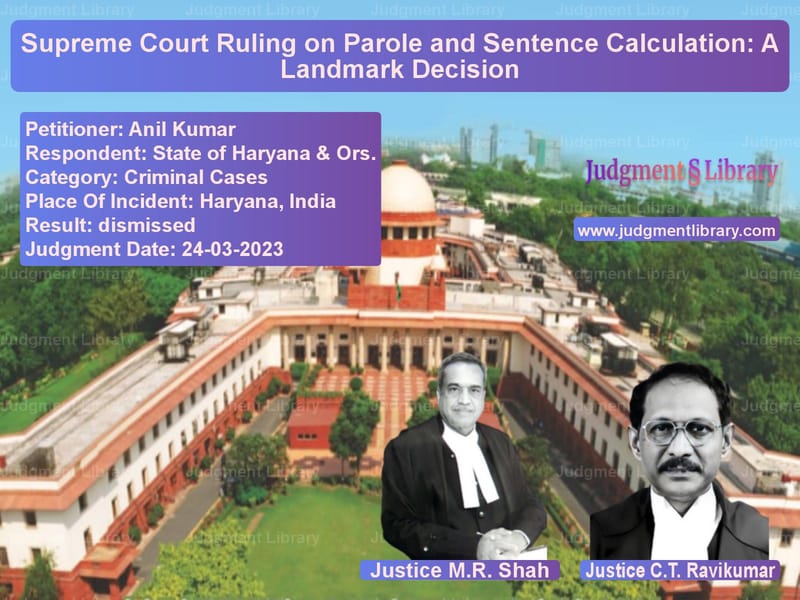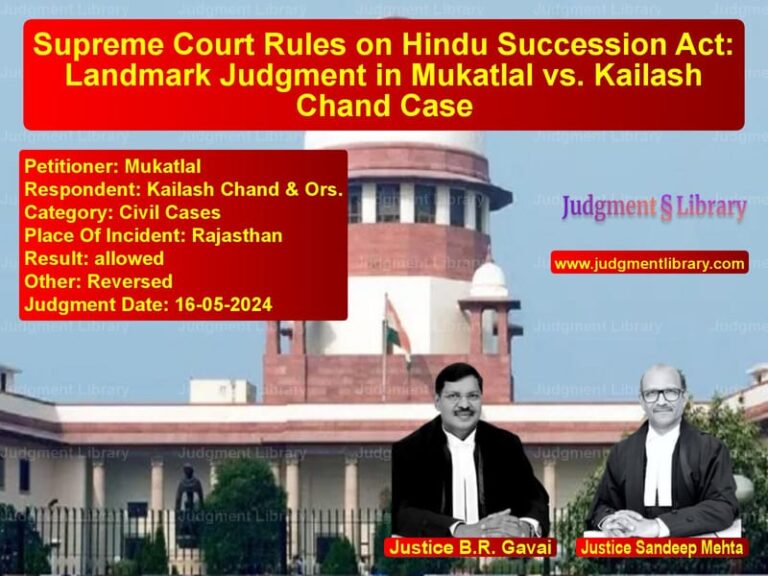Supreme Court Ruling on Parole and Sentence Calculation: A Landmark Decision
The Supreme Court, in its ruling in Anil Kumar v. State of Haryana & Ors., addressed a crucial legal issue concerning whether the period spent on parole should be counted as part of a convict’s total sentence. The petitioner, Anil Kumar, who was serving a life sentence under Sections 302/34 of the Indian Penal Code (IPC), challenged the exclusion of his emergency parole period from the total sentence duration. This case holds significance as it clarifies legal principles governing parole and sets a precedent for future cases.
Background of the Case
Anil Kumar was convicted and sentenced to life imprisonment for murder. During the COVID-19 pandemic, he was granted emergency parole as per the guidelines issued by a High-Powered Committee (HPC) constituted under the Supreme Court’s directive in Suo-Moto W.P. (C) No. 1/2020. After serving his sentence, Kumar applied for consideration of his parole period as part of his total incarceration, which was rejected by the prison authorities.
Aggrieved by the rejection, Kumar moved the High Court, which upheld the decision of the authorities, stating that parole is a temporary release and does not count as incarceration. He then approached the Supreme Court, challenging the constitutional validity of such an interpretation.
Legal Issues Before the Court
- Whether the period spent on parole should be considered part of the total sentence duration.
- Whether excluding parole from sentence calculation violates a convict’s right to fair and equal treatment.
- Whether emergency parole granted during COVID-19 falls within the same category as regular parole.
Arguments by the Petitioner
- Parole was granted due to extraordinary circumstances: The petitioner argued that he did not apply for parole voluntarily but was released due to a government-mandated directive. Hence, he should not suffer adverse consequences for a decision that was not his.
- Violation of fundamental rights: The exclusion of parole from sentence calculation amounted to a violation of Articles 14 and 21 of the Constitution of India.
- Precedents from other states: In some states, parole duration was counted toward sentence calculation. The petitioner argued that this discrepancy created inequality in the legal treatment of convicts across jurisdictions.
- Potential for arbitrary application: The petitioner contended that granting parole under the guise of temporary release while later excluding it from sentence calculation created an arbitrary and unjust situation.
Arguments by the Respondents
- Parole is a privilege, not a right: The State of Haryana argued that parole is a discretionary relief granted under special circumstances and is not an entitlement.
- Haryana Good Conduct Prisoners (Temporary Release) Act, 1988: Section 3(3) of the Act clearly states that parole does not count toward the sentence period.
- Public safety concerns: Allowing parole to be counted as sentence time would create a loophole where convicts could misuse the provision to secure release without actual imprisonment.
- Legal consistency: The respondents referred to prior Supreme Court rulings affirming that parole cannot be equated with imprisonment and, thus, should not contribute to the total sentence duration.
Supreme Court’s Observations
Legal Interpretation of Parole
The Court examined whether parole should be considered part of the sentence under the framework of the Prisons Act, 1894 and other statutory provisions.
“Parole is a privilege extended by the state for specific reasons and does not alter the nature of the convict’s sentence.”
Constitutional Considerations
The Supreme Court acknowledged the petitioner’s concerns about unequal treatment across states but ruled that different states have different prison rules, and uniformity in parole laws does not automatically apply unless challenged separately.
“While the argument on legal inconsistencies is valid, the Court cannot legislate on behalf of the state and must uphold the existing statutory framework.”
Impact of COVID-19 Emergency Parole
The Court distinguished emergency parole granted during the pandemic from regular parole, stating that it was a humanitarian measure rather than a legal right.
“The emergency release of prisoners due to COVID-19 was a temporary measure to protect inmates from health risks and does not change the fundamental nature of parole.”
Final Judgment
The Supreme Court upheld the High Court’s decision and ruled:
- The petitioner’s parole period would not be counted toward his total sentence.
- There was no violation of constitutional rights, as the exclusion of parole was explicitly provided under existing legal provisions.
- The Haryana Good Conduct Prisoners Act was upheld as constitutionally valid.
- Convicts must serve their entire sentence as per judicial pronouncements, excluding time spent outside prison on parole.
Impact of the Judgment
- Legal Consistency: Reinforces the principle that parole does not equate to sentence time.
- Prison Administration: Ensures that parole remains a discretionary relief rather than a means to reduce actual incarceration.
- Precedent for Future Cases: Establishes a guiding principle for other states facing similar parole disputes.
Conclusion
The Supreme Court’s ruling in Anil Kumar v. State of Haryana clarifies that parole is a temporary release granted under specific circumstances and does not contribute to the completion of a convict’s sentence. The judgment upholds the principle that statutory provisions governing parole must be strictly adhered to, ensuring uniformity and legal clarity in criminal jurisprudence.
Petitioner Name: Anil Kumar.Respondent Name: State of Haryana & Ors..Judgment By: Justice M.R. Shah, Justice C.T. Ravikumar.Place Of Incident: Haryana, India.Judgment Date: 24-03-2023.
Don’t miss out on the full details! Download the complete judgment in PDF format below and gain valuable insights instantly!
Download Judgment: anil-kumar-vs-state-of-haryana-&-o-supreme-court-of-india-judgment-dated-24-03-2023.pdf
Directly Download Judgment: Directly download this Judgment
See all petitions in Bail and Anticipatory Bail
See all petitions in Custodial Deaths and Police Misconduct
See all petitions in Attempt to Murder Cases
See all petitions in Fraud and Forgery
See all petitions in Judgment by Mukeshkumar Rasikbhai Shah
See all petitions in Judgment by C.T. Ravikumar
See all petitions in dismissed
See all petitions in supreme court of India judgments March 2023
See all petitions in 2023 judgments
See all posts in Criminal Cases Category
See all allowed petitions in Criminal Cases Category
See all Dismissed petitions in Criminal Cases Category
See all partially allowed petitions in Criminal Cases Category







